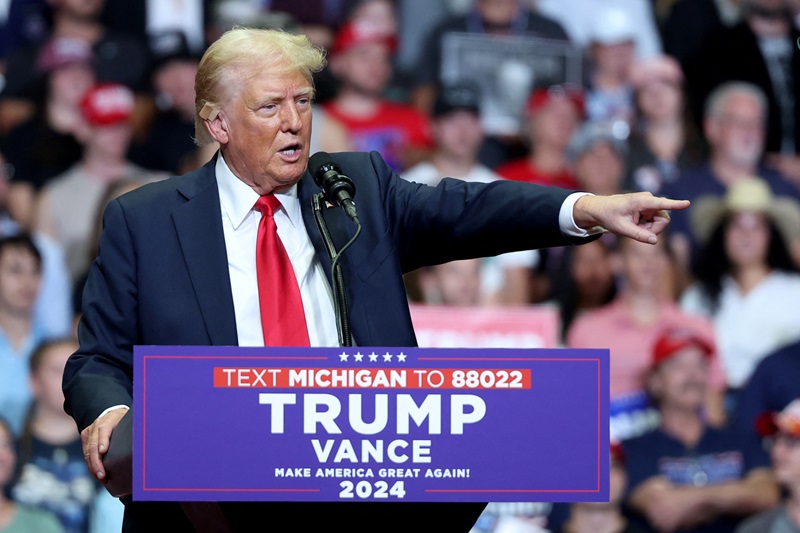More than 70 percent of 30 domestic investors surveyed by the Korea Chamber of Commerce and Industry (KCCI) said they would delay, reduce or cancel planned investments in the United States if the country’s federal and state governments were to revoke incentives they’d previously promised following a change in administration after the upcoming November elections.
Companies who spoke to the JoongAng Ilbo, an affiliate of the Korea JoongAng Daily, said state governments have already been stalling negotiations with a wait-and-see approach.
One large company that spoke on the condition of anonymity said it had been negotiating with a state government for two years on potential tax benefits the state had offered in order to court the construction of a production facility in its jurisdiction. The two parties were reportedly on the way to an agreement until a few months ago, when a shift in mood made the whole deal uncertain.
“They were enthusiastic to secure an investment in the beginning, but negotiations have halted now as they say they will wait for the results of the U.S. elections to come out,” a source at the firm said.
“We might reconsider our investment plans from square one,” the insider said, adding that the company was also considering moving its investments to Canada or Mexico.

Over 70 percent of 30 firms the JoongAng Ilbo and the Korea Chamber of Commerce and Industry surveyed said they would delay, reduce or cancel planned investments in the United States if the country’s federal and state governments were to revoke incentives they’d previously promised following a change in administration after the upcoming November elections.
Twenty-three of 30 firms the JoongAng Ilbo and KCCI surveyed said they would change their investment plans should the U.S. federal and state governments fail to follow through on promised incentives, according to the report released Sunday. More specifically, 40 percent said they would delay their planned investments; 33.3 percent said they would reduce the amount they planned to spend; 3.3 percent said they would cancel plans; and 23.3 percent said they would go ahead as planned. The respondents were firms that had invested at least $5 million in the United States within the last three years.
Asked about those promised investment incentives, 22 of the 30 respondents said the carryout process has been slow, while the remaining eight said they were mostly coming through. Tax benefits, such as corporate tax cuts, were the most common bounty, with 20 of the surveyed firms having been promised them in some form. Following this was pledged support for infrastructure construction such as roads and water and electricity channels at 26.7 percent, other financial subsidies at 20 percent, free land leases at 13.3 percent and government purchases at 10 percent.
Large companies — which Korea defines as firms with total assets exceeding 10 trillion won ($7.3 billion) — were more likely to recognize a potential change in U.S. administration a large threat than smaller businesses were.

When asked if they had uncertainties about their current or future investment plans in the United States following the presidential elections, 6.3 percent of respondents said they were “very uncertain,” 62.5 percent said they were “largely uncertain,” 25 percent said they were “largely certain” and 6.3 percent said they had almost no uncertainty. On the other hand, two-thirds of midsize businesses said they largely had no uncertainty about their future investment prospects while only 16.7 percent said they were largely uncertain.
This is because large companies have mostly made long-term investments in high-tech emerging industries, mostly on the back of U.S. government incentives.
After the Biden administration passed the CHIPS and Science Act and the Inflation Reduction Act in 2022, large Korean firms made large-scale investments to receive subsidies and benefit from tax cuts. This makes them vulnerable to potential policy changes that Republican nominee Donald Trump has promised as part of his campaign.
Korea was the largest investor in the United States last year according to the Financial Times, with firms committing $21.5 billion. But many companies don’t have a concrete plan for a change in the country’s government. Seventy percent of respondents said they were “preparing a response” for any attached uncertanties while 26.7 percent said they had “no response plan” and 3.3 percent said they were prepared.

“We are concerned that America First policies will be strengthened regardless of who is elected,” said a source from an anonymous large company that operates a factory in the United States. “We will likely proceed with our investment planned for next year but will respond in line with the next administration’s policy changes.”
Analysts say Korea should build on its outreach to the United States so that the new U.S. administration will carry out the promises its predecessor made to Korean firms.
“It is cruel that a company’s investment that was made in consideration of their mid- to long-term prospects and underwent intense negotiations to be flipped,” said Kim Moon-tae, head of KCCI’s industrial policy division.
“The public and private sectors must work together to ensure that [Korean] companies are not left out after the U.S. elections,” Kim added.
Some experts emphasize that companies should be more conservative when judging the consistency and continuity of U.S. government policies and make their investment decisions responsibly.
“Companies consider the market, technology and resources when looking for a place for investment, but they will also have to take policy changes and geopolitical risks into account,” said Heo Yoon, a professor of international trade at Sogang University.
“Large companies will be able to monitor global changes, but midsize businesses might find it difficult, so the government should be quick on updating them on information,” Prof. Heo said.
BY CHOI SUN-EUL [kim.juyeon2@joongang.co.kr]




